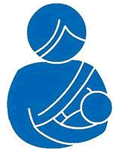Mothers
with Hepatitis B Can Safely Breastfeed
SUMMARY
Women with chronic HBV infection can breastfeed with minimal
risk of transmitting the virus to their babies if they
use standard prophylactic therapy, according to a recent
review. |
By
Liz Highleyman
 Hepatitis
B virus (HBV) is a blood-borne pathogen can be transmitted
from mothers to infants during pregnancy or delivery. Research
has shown that use of prophylactic therapy including hepatitis
B immune globulin (HBIG) and HBV vaccination can prevent infant
infection at birth, but transmission via breastfeeding has been
less extensively studied. Hepatitis
B virus (HBV) is a blood-borne pathogen can be transmitted
from mothers to infants during pregnancy or delivery. Research
has shown that use of prophylactic therapy including hepatitis
B immune globulin (HBIG) and HBV vaccination can prevent infant
infection at birth, but transmission via breastfeeding has been
less extensively studied.
As described in the May
2, 2011, advance issue of Archives of Pediatrics and Adolescent
Medicine, Zhongjie Shi from Sun Yat-sen University in
Guangzhou, China, and colleagues performed a systematic review
and meta-analysis of studies looking at the role of breastfeeding
in mother-to-child HBV transmission.
The review authors searched medical literature databases including
MEDLINE, EMBASE, Cochrane Library, National Science Digital
Library, and China Biological Medicine Database for relevant
studies published between January 1990 and August 2010; they
also interviewed experts in the field.
Shi's team selected prospective, peer-reviewed, controlled clinical
trials that examined breastfeeding as a route of HBV exposure.
Babies were given HBIG and an initial HBV vaccine dose soon
after birth, with follow-up vaccine doses over the next several
months.
The researchers collected data on HBV intrauterine infection,
maternal blood and breast milk infectiousness, infant immune
prophylaxis methods and response, and occurrence of adverse
events.
Results
 |
The
analysis included 10 studies that met the inclusion criteria,
all done in China. |
 |
These
studies involved a total of 751 infants in the breastfeeding
group and 873 infants in the non-breastfeeding group.
|
 |
By
the age of 12 months, 31 infants in the breastfeeding
group tested positive for HBV, compared with 33 in the
non-breastfeeding group. |
 |
According
to infant blood tests for hepatitis B surface antigen
(HBsAg) or HBV DNA positivity at age 6 to 12 months, HBV
transmission occurred with similar frequency in the breastfeeding
and non-breastfeeding groups (odds ratio 0.86). |
 |
According
to infant blood hepatitis B surface antibody (anti-HBs)
positivity at 6 to 12 months, babies in both groups were
equally likely to develop surface antibodies (odds ratio
0.98). |
 |
No
adverse events or complications were observed during breastfeeding. |
Based
on these findings, the study authors concluded, "Breastfeeding
after proper immunoprophylaxis did not contribute to mother-to-child
transmission of HBV."
Given that the rate of infection was similar in infants in the breastfeeding
and non-breastfeeding groups, the investigators suggested that the
small number of infections likely occurred during pregnancy or delivery.
Breastfeeding should generally be recommended for its nutritional
value, they said, but women should avoid it if they have cracked nipples
or sores than could expose babies to blood.
Investigator affiliations: Third Affiliated Hospital of Sun Yat-sen
University, Guangzhou, China; Department of General Surgery, Second
Affiliated Hospital and Harbin Medical University, Harbin, China;
Heilongjiang Academy of Traditional Chinese Medicine, Harbin, China;
Department of Chemistry and Health Science Center, Temple University,
Philadelphia, PA.
5/24/11
Reference
Z
Shi, Y Yang, H Wang, et al. Breastfeeding of Newborns by Mothers
Carrying Hepatitis B Virus: A Meta-analysis and Systematic Review.
Archives of Pediatrics and Adolescent Medicine (abstract).
May 2, 2011 (Epub ahead of print).
|
